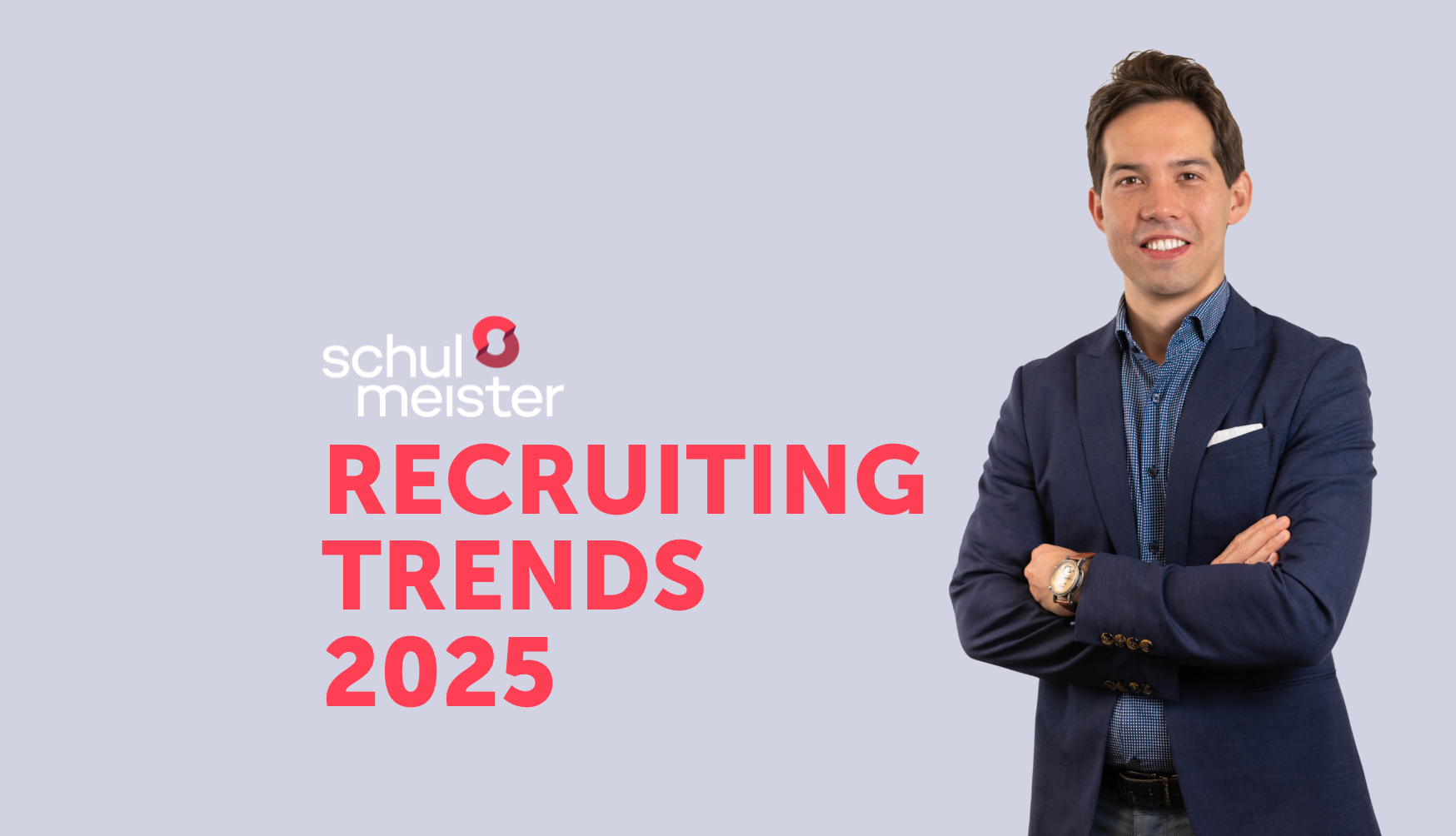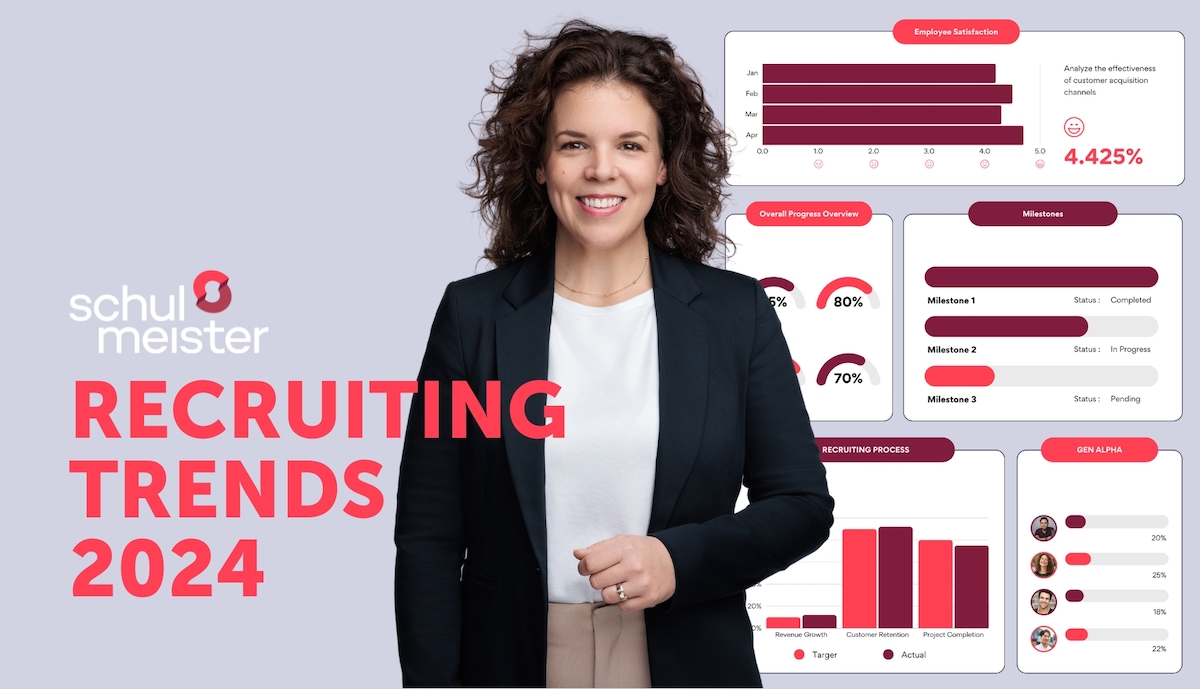Based on the findings of the World Economic Forum's Future of Jobs Report 2025, we have summarized the five key recruiting trends of this year for you.
Trend No. 1: Artificial intelligence (AI) will be a game changer – but only for those who use it correctly.
Automated screening processes, AI-supported matching algorithms and smart chatbots for applicant management are nothing new. But in 2025, it is no longer just about automation, but the quality of AI use. Companies that simply filter applications faster will not have an advantage. The deciding factors will be:
- Bias-free algorithms: AI must be programmed to avoid unconscious discrimination.
- Advanced prediction models: Smart tools can not only analyze qualifications, but also evaluate the long-term fit of a candidate with the corporate culture.
- Human control remains essential: AI can support the selection process, but it can't replace it. Companies that rely purely on automation risk a sterile candidate experience. We explain why collaboration between humans and machines is important in our article The future of recruitment: Will AI replace the industry?
- Generative AI as an opportunity and a risk: Generative AI can be used productively to improve recruiting processes. However, it also carries the risk of frustrating applicants with impersonal or incorrect answers.
Practical tip: Those who use AI should communicate transparently how it is used. Studies show that applicants view AI in recruiting positively as long as they feel they are being treated fairly.
Trend No. 2: Flexible working is no longer a bonus, but a minimum standard
In 2025, hybrid working, individual working hours and workation concepts are no longer a benefit, but a matter of course. Companies that continue to rely on rigid structures will lose top talent to more flexible competitors. But flexibility means more than just home offices:
- Asynchronous collaboration: Not everyone works at the same times. Digital tools such as Notion, Slack or Loom help to make collaboration efficient.
- Global recruiting strategies: Thanks to remote work, companies can recruit worldwide – but they also have to take legal, tax and cultural differences into account.
- Performance instead of a presence culture: Employee success must be measured by results, not attendance times.
Practical tip: Companies should define clear guidelines for remote work and hybrid models so that employees know what is expected of them.
Trend No. 3: Diversity, Equality & Inclusion (DEI) – a must for future-proof companies
Diversity in the company is not a trend, but an economic necessity. The topic was already present in recruiting in 2024. Studies show that diverse teams are more innovative and make better decisions. But in 2025, diversity can no longer be a buzzword – companies must make DEI measurable:
- Anonymous application processes: Studies show that anonymous application processes reduce prejudice and increase equal opportunities.
- Avoiding unconscious bias in AI: Algorithms must be programmed in such a way that they do not reinforce existing prejudices.
- Training managers: Diversity only works if management is also aware of it.
- Focus more on promoting women: Despite a decline in global unemployment rates, the gap between men and women remains. Companies should take targeted measures to promote female talent.
Practical tip: Those who take DEI seriously should develop and regularly evaluate internal measurement criteria for diversity.
Trend No. 4: Employer branding is the key to success or failure
The “candidate experience” is just as important as the “customer experience”. Applicants research on social media, Glassdoor or kununu before they apply. If you want to be perceived as an attractive employer, you have to:
- Create transparency: Salary information, career opportunities and corporate culture must be clearly communicated.
- Use active employees as ambassadors: Candidates trust real employees the most.
- Guarantee a fast application process: Companies with slow response times will lose top talent to the competition.
- Combine employer branding with technology: Companies can use AI to show candidates personalized career paths.
Practical tip: Regular social media engagement and authentic insights into everyday work are a must.
Trend No. 5: The candidate experience will decide the war for talent
In 2025, application processes must be radically applicant-friendly. Unclear requirements, delayed responses or complicated application forms are deal-breakers. The best companies rely on:
- One-click applications: Anyone who still has to fill out long forms today will drop out.
- Fast and appreciative communication: A confirmation of receipt and a response within a week should be the minimum standard.
- Personalized processes: The better the application process is tailored to the individual candidate, the higher the completion rate.
- Use technology to increase efficiency: Companies are increasingly relying on automation to make processes more efficient and to relieve recruiting teams.
Practical tip: If you want to attract talent, you should regularly scrutinize and optimize application processes with your own tests.
Conclusion: Companies must act – or lose out
In 2025, recruiting will not be won by those who rely on general trends, but by those who act wisely and strategically.
- AI is only an advantage if used fairly and intelligently.
- Flexible working is a requirement, not an added benefit.
- Diversity must be measurable and not just a buzzword.
- Employer branding will determine success in recruiting.
- The candidate experience determines who gets the best talent.
Companies that are still working with slow, complicated and unattractive recruiting processes in 2025 will have a massive problem – because the best talent will be gone faster than they think.
Would you like to read the entire Future of Jobs Report 2025? Click here to download the PDF.





